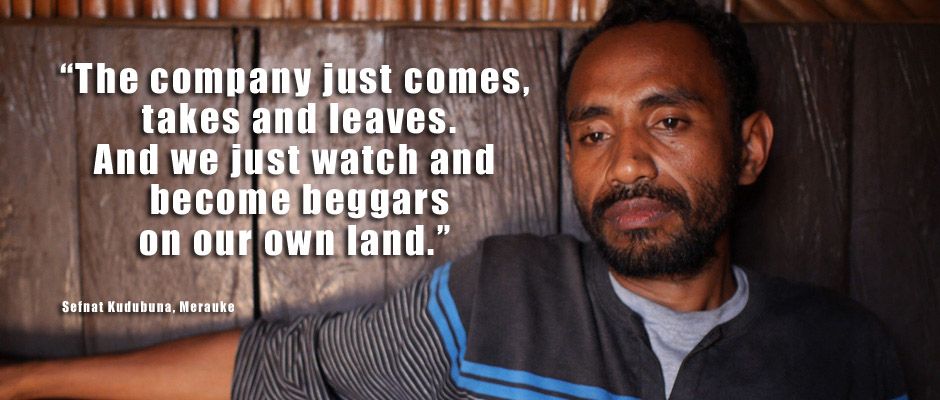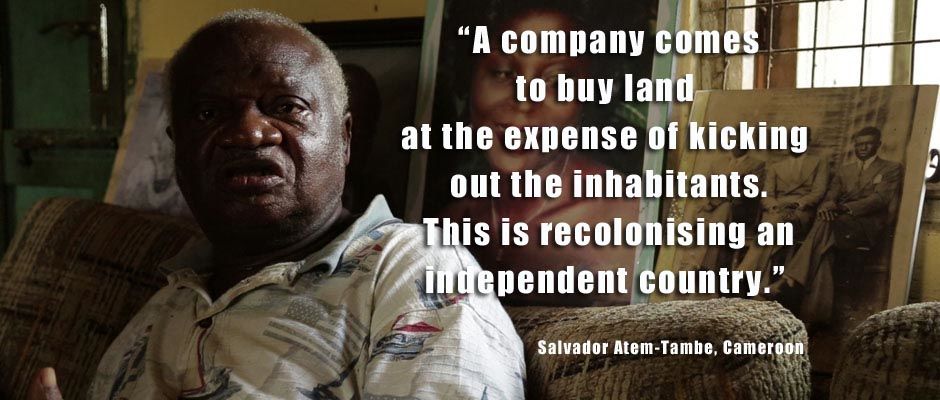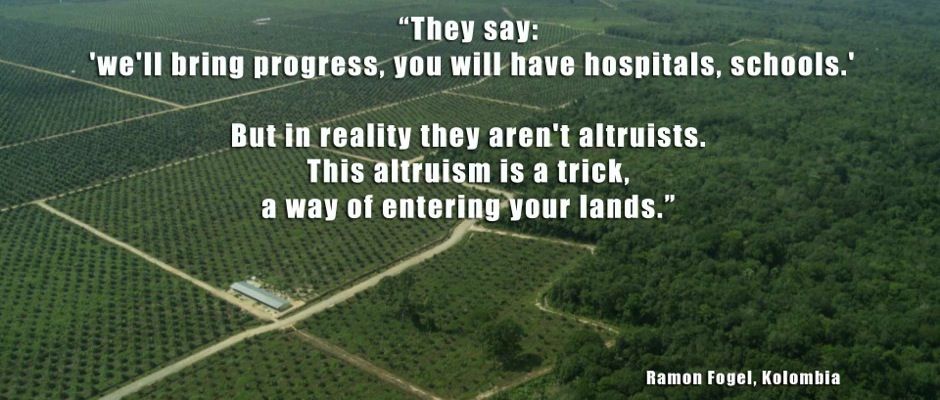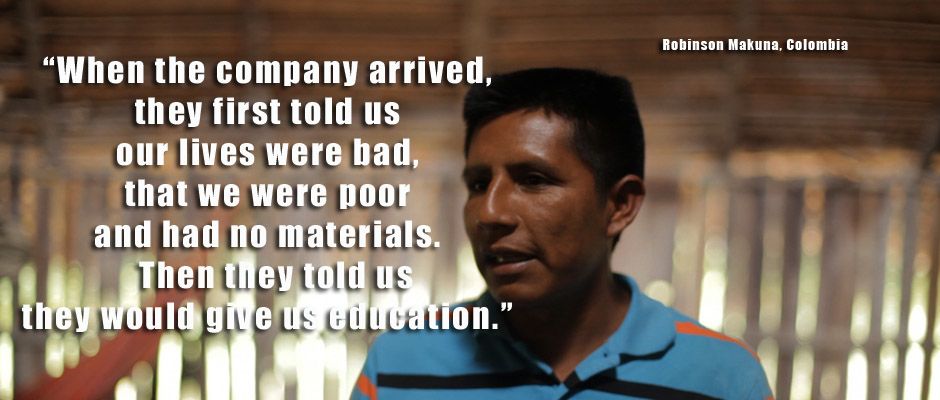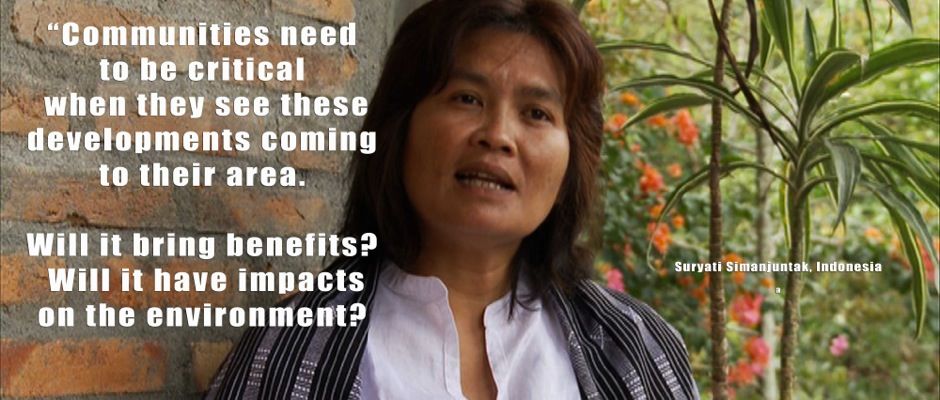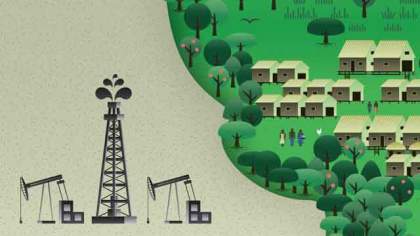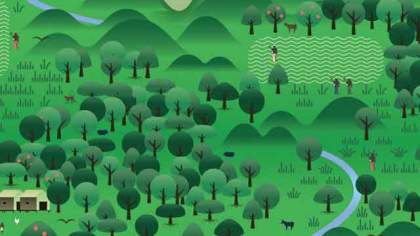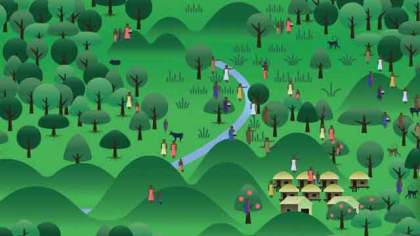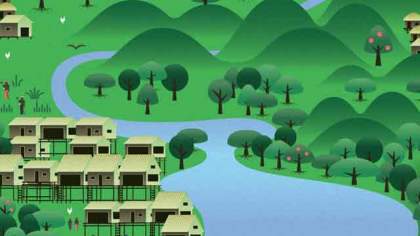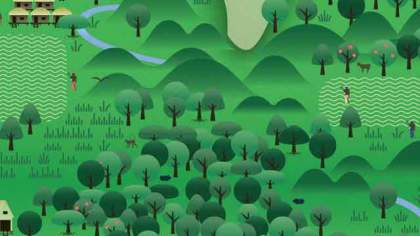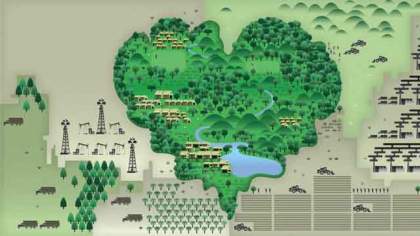-
What is 'Company Tactics' about?
This video describes the tactics that companies use to convince communities to accept and support their projects, and shows that these tactics are used across continents and industries.
When communities are aware of these tactics and are prepared for how to counter them, they are more likely to be able to maintain their position in dealing with land decisions concerning outside developments. The video is based on the experiences of communities in Cameroon, Indonesia and Paraguay.Length of Video
14 minutes.
Why screen 'Company Tactics'?
This video should be screened in communities where plantations, mining or other large-scale developments are happening or could happen in future.
Download 'Company Tactics' here.
Watch in French, Spanish, Indonesian, English, Baka, Bagyeli, Tok Pisin and Swahili
Suggestions for Discussion Questions after community screenings
- What are the characteristics of good and of bad consultation and consent? Who should be involved?
- Make a list of the tactics you are aware of that companies use to get land (for example, promises of development, bribery and corruption, intimidation and agression, amongst others). For each tactic, make a list of possible ways to counter these tactics.
- Which person or institution should represent your community in negotiations with outsiders?
- If your community suspects that a leader is not representing the wider views of the community, or is corrupt, what steps can you take, or what sanctions could you impose?
Suggestions for Follow-up Activities after community screenings- Carry out a role-play of a socialisation meeting, where various tactics are used and countered by the community.
- If a company is interested in investing in your area, send representatives from your community to visit other communities where that same company is operating to find out about their experiences.
-
Documents and Downloads
A Training Manual on Advocacy, Lobbying and Negotiation Skills
Indigenous peoples assert that rights cannot be compromised; however, indigenous peoples’ delegates have recognized the need to strengthen existing skills and capacities for lobbying and advocacy. AIPP member/partner organizations pointed out the need for a manual to help empower indigenous peoples with knowledge and skills for effective advocay and lobbying to help empower indigenous peoples with knowledge and skills for effective advocay and lobbying. Thus AIPP developed this training manual on “Advocacy, Lobbying and Negotiation Skills for Indigenous Peoples in Climate Change and REDD+.” (AIPP, 2013)
Communities as Counterparties
An analysis of almost 73,000 concessions in eight tropical forested countries, more than 93% of these developments were found to involve land inhabited by Indigenous Peoples and local communities. This report, prepared by The Munden Project, highlights the alarming amount of land that governments have handed over to the private sector for mining, logging, agriculture, oil and gas, including 40% of all land in Peru and 30% in Indonesia. (RRI 2014)
Conflict or Consent?
Oil palm has become one of the world’s most controversial crops. Lucrative for some, its social and environmental impacts are often severe. To avert criticism, some of the more progressive companies have promised to only finance, produce, trade and buy palm oil that is ‘sustainably’ produced. Since 2005, the Roundtable on Sustainable Palm Oil (RSPO) has required that member companies respect communities’ legal and customary rights and only develop oil palm on their lands with their free, prior and informed consent. Are the companies keeping their promises? Have they changed the way they develop and manage lands since this new standard was adopted? This volume of 16 detailed case studies from six countries seeks to answer these questions. ( FPP, Sawit Watch and TUK Indonesia, 2013)
Exploitation and empty promises: Wilmar’s Nigerian landgrab
This document uses first-person testimonies, satellite maps, and Wilmar’s own filings with the Roundtable on Sustainable Palm Oil to demonstrate that the company failed to gain the Free, Prior and Informed Consent of communities directly affected by its operations; failed to produce adequate Environmental and Social Impact Assessments; and failed to live up to promises of infrastructure development and benefit sharing, despite these promises being a primary incentive for local communities to allow the company to operate in Cross River State. (foei.org, 2015)
Free, Prior and Informed Consent and the RSPO
This briefing, launched on the occasion of the 10th Roundtable on Sustainable Palm Oil, draws together the key findings of fourteen studies on FPIC in RSPO member/certified plantations based on the RSPO Principles & Criteria and related Indicators and Guidance, and makes recommendations for reforms in the way palm oil companies honour the principle of FPIC and respect customary rights to land. (FPP / SawitWatch, 2012)
Handbook on Community Engagement
A ‘good practice’ guide to negotiating lease agreements with landowning communities in South Sudan, which also makes a usuful read for communities elswhere (South Sudan Law Society, 2011 )
Nature is not for Sale!
Respect communities' rights. Stop the takeover of nature by finance! In the run up to the 2012 UN Conference on Sustainable Development in Rio de Janeiro, Friends of the Earth France launched their ‘Nature is not for sale!’ campaign, to highlight the dangers of putting a price on nature. Making nature, ecosystems and water tradable will not solve our current global crisis and this short and accessible citizens’ guide explains why. It also criticises the finance sector’s ‘Natural Capital Declaration’ which outlines new market mechanisms which the finance sector aims to use as part of the so-called ‘green economy’. (Les Amis de la Terre France, 2012)
Oil Dependency and the Peruvian Amazon: How Oil Companies Have Exploited the Rainforest of Loreto
For more than 40 years, oil activity has brought destruction to the ecosystems and the indigenous people of four river basins, all major tributaries to the Amazon, which gives life to the biggest rainforest on Earth. The operator responsible for this human and environmental disaster, Pluspetrol Norte S.A., has evaded any responsibility. The company’s contract expires on August 29, 2015, but now a new oil lot, 192, has been created and put up for sale. Three big oil companies have shown an interest, including Pluspetrol Norte S.A, but the indigenous people of the River Tigre have stated they will not permit this operator to stay one day longer on their territories. Read their testimonies and more about the impact of oil exploitation in this report (Chaikuni Institute, 2015).
Surrendering Our Future
A new report released by the Oakland Institute reveals how the lives and livelihoods of more than 9,000 pastoralists and a protected ecosystem in northwestern Senegal are directly threatened by a foreign-controlled 20,000-hectare plantation. Owned by an international conglomerate with hidden investors and suspicious connections, Senhuile SA is a joint venture controlled by Italy's Tampieri Financial Group, Senegalese investors, and Agro Bioethanol International, a shell company registered in New York. (Oakland Institute, 2014)
Other videos
Corporate Branding: Asia Pulp & Paper - Reforestation Television Ad
This is an advertisement BY Asia Pulp & Paper (APP)
Don’t Pulp Pandumaan-Sipituhuta: A David and Goliath Tale
The pulp and paper industry is growing all over Indonesia. The Toba Pulp Lestari (TPL) company, is expanding its eucalyptus plantations on the lands of the indigenous communities of Pandumaan-Sipituhuta in North Sumatra. The communities have lived and worked on their lands for 13 generations. They are peacefully resisting to defend their forests and their livelihoods. But their defence of their lands comes at a heavy cost as they are criminalised. Please stand together with this community at the front-line of the global land grab that is putting profit ahead of rights. (Pandumaan-Sipituhuta / KSPPM / LifeMosaic, 2013)
Manufacturing Consent
Evidence and testimony from Muara Tae, in East Kalimantan, Indonesia, of the abuses of oil palm company First Resources Ltd thought its subsidiary PT Borneo Surya Mining Jaya (PT Borneo). (EIA, 2012)
Related links
farmlandgrab.org
This website contains mainly news reports about the global rush to buy up or lease farmlands abroad as a strategy to secure basic food supplies or simply for profit. Its purpose is to serve as a resource for those monitoring or researching the issue, particularly social activists, non-government organisations and journalists.
Forest Peoples Programme
Forest Peoples Programme (FPP) was founded in 1990 in response to the forest crisis, and focuses on working to support the rights of forest dependant communities around the world. The website includes an overview of the NGO's work as well as a rich resources and publications section..
-
Additional Information
Indigenous and local communities are routinely not consulted when land deals are made, and as a result are dispossessed of their lands, become displaced or find themselves embroiled in violent conflicts when attempting to protect their homes.
When consulted, communities are often misled or insufficiently informed about the impacts of the deals. Many communities mistakenly believe they will retain rights over and access to their territories, lands and resources. Many are not informed about the environmental impacts and pollution associated with modern agricultural practices or resource extraction, and the consequences that these will have for their livelihoods.
Company Tactics - Territories of Life
This video describes the tactics many companies use to convince communities to accept and support their projects.

